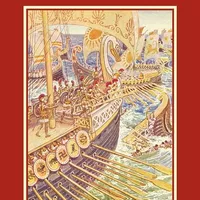34. The Story of Romulus and Remus
"The troubled river knew them, And smoothed his yellow foam, And gently rocked the cradle That bore the fate of Rome." —MACAULAY.
Going westward from Greece, another peninsula stretches down into the Mediterranean Sea. In shape it is something like a long leg, and at the lower end, lies the island of Sicily, which resembles a foot. We have already heard something of Sicily, and seen how the Greeks had colonies there. There is also the old story of how Æneas escaped from the siege of Troy, carrying on his back his aged father, and how, after years of adventures, he landed on the shores of Italy and built the city of Alba Longa, where for hundreds of years his descendants lived.
At the end of this time—so runs the old legend—there was a king called Numitor. He had a brother, Amulius, who drove him from the throne, slew his daughter, and seized her two baby sons. Amulius then gave orders, that the babies should be thrown into the river Tiber, which flowed through the city. Now the Tiber had overflowed its banks, and when the waters began to subside the cradle containing the twin babies was left high and dry, on the shallow ground, at the foot of the Palatine Hill.
There, says the story, they were found by a shepherd. He was walking by the river, when he saw a cradle lying under a fig-tree, and beside the cradle, stood a large wolf. She had taken care of the children, but now she ran away into the woods and the shepherd carried the babies home to his wife. She named them Romulus and Remus, and brought them up as shepherds.
So in this home at the foot of the Palatine Hill the boys grew to manhood,—they grew also very strong and brave. One day, as years went on, they discovered their origin, that they were the grandsons of Numitor, who had been dethroned by his brother. So the twins arose, collected an army, drove away Amulius, and brought their grandfather back to Alba Longa. They then resolved to build a new city for themselves, on one of the seven low hills, beneath which ran the yellow river Tiber.
But Remus wanted to build on one hill and Romulus on another. Their grandfather advised them each to stand on a hill, and whichever of them saw the greatest number of vultures flying, he should build the city on his chosen hill. Remus saw six vultures, but Romulus saw twelve from the Palatine Hill, so that was made the beginning of the new city, and Romulus was chosen king.
Yoking together a white cow and a snow-white bull to a ploughshare, he drew a furrow around the Palatine and began to build the walls of the city. But Remus was angry with him, and before the walls had reached his own height he jumped over them, mocking as he did so. He was immediately slain, while Romulus cried, "So perish all who dare to climb these ramparts." He called the name of the city Rome, after himself, and lived in a mud hovel, covered with thatch in the midst of it.
This was in the year 753, and the Romans count their history from this date, just as the Greeks count theirs from the beginnings of the Olympic games.
Under Romulus the population of the new city grew apace, partly because he allowed it to be a refuge for runaway slaves and murderers. He made laws and appointed a senate—a body of elderly men to help him with the government. It was this Romulus, too, who divided the year into ten months, the first being March, named from Mars, the god he delighted to honour. But his successor added two more, making January the first month, after the god Janus, to whom he had built a temple.
This was how Rome began,—that Rome which was to play such an immense part in the world's great history—Rome, the Eternal City; Rome, the City of the Seven Hills; Rome, long ago, the Mistress of the World.

